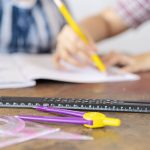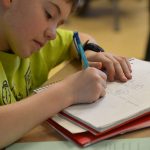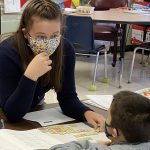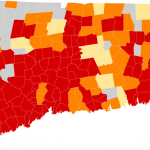The first comprehensive review of research on summer math programs in over 15 years suggests they may help mitigate the learning losses disproportionately experienced by low-income pre-K–12 students during the pandemic. The meta-analysis was published this week in Review of Educational Research, a peer-reviewed journal of the American Educational Research Association.
Kenya Overton and Andrew Kuck, Neag School of Education doctoral students in the Department of Curriculum and Instruction, prepared the following rapid research brief on secondary math education with the Center for Education Policy Analysis, Research, and Evaluation (CEPARE).
Britney Jones, Neag School of Education doctoral student in the Department of Educational Leadership, prepared the following rapid research brief with the Center for Education Policy Analysis, Research, and Evaluation (CEPARE).
What tips do you have for fighting stress without spending money?
“A global analysis has found that kids whose schools closed to stop the spread of various waves of the coronavirus lost educational progress and are at increased risk of dropping out of school. As a result, the study says, they will earn less money from work over their lifetimes than they would have if schools had remained open,” says Sandra Chafouleas, a UConn Board of Trustees Distinguished Professor of Educational Psychology.
“School assignments that a student is expected to do outside of the regular school day—that’s homework,” says Sandra Chafouleas, a UConn Board of Trustees Distinguished Professor at the Neag School of Education. “The general guideline is 10 minutes of nightly homework per grade level beginning after kindergarten. This amounts to just a few minutes for younger elementary students to up to 2 hours for high school students.”
“School assignments that a student is expected to do outside of the regular school day—that’s homework,” says Sandra Chafouleas, a UConn Board of Trustees Distinguished Professor of Educational Psychology. “The general guideline is 10 minutes of nightly homework per grade level beginning after kindergarten. This amounts to just a few minutes for younger elementary students to up to 2 hours for high school students.”
People tend to look at maps as information that should be taken as fact without the need for analysis, but that’s a mistake. When the average person consumes information through sources like television, radio, a website, or a newspaper, they might do it with a critical eye. What is the viewpoint of the news outlet? Has it been trustworthy in the past? Is there another source for this information to get a second opinion? A map is different. People tend to look at maps as absolute information that should be taken as fact without analysis. But that’s a mistake, according to a pair of UConn professors from the Neag School of Education in a recent article published in Social Studies Research and Practice.
When the average person consumes information through sources like television, radio, a website, or a newspaper, they might do it with a critical eye. What is the viewpoint of the news outlet? Has it been trustworthy in the past? Is there another source for this information to get a second opinion? A map is different. People tend to look at maps as absolute information that should be taken as fact without analysis. But that’s a mistake, according to a pair of UConn professors from the Neag School of Education in a recent article published in Social Studies Research and Practice.
Neag School of Education professor of science education Todd Campbell is working on two grants focused on expanding the diversity and accessibility of science education in Connecticut and beyond. The first grant is funded through a $1.5 million National Science Foundation grant. The project will develop and implement a unit on the science of COVID-19 through a social justice lens, while also supporting groups of teachers to develop, test, and refine justice-centered instructional practices in local schools.






